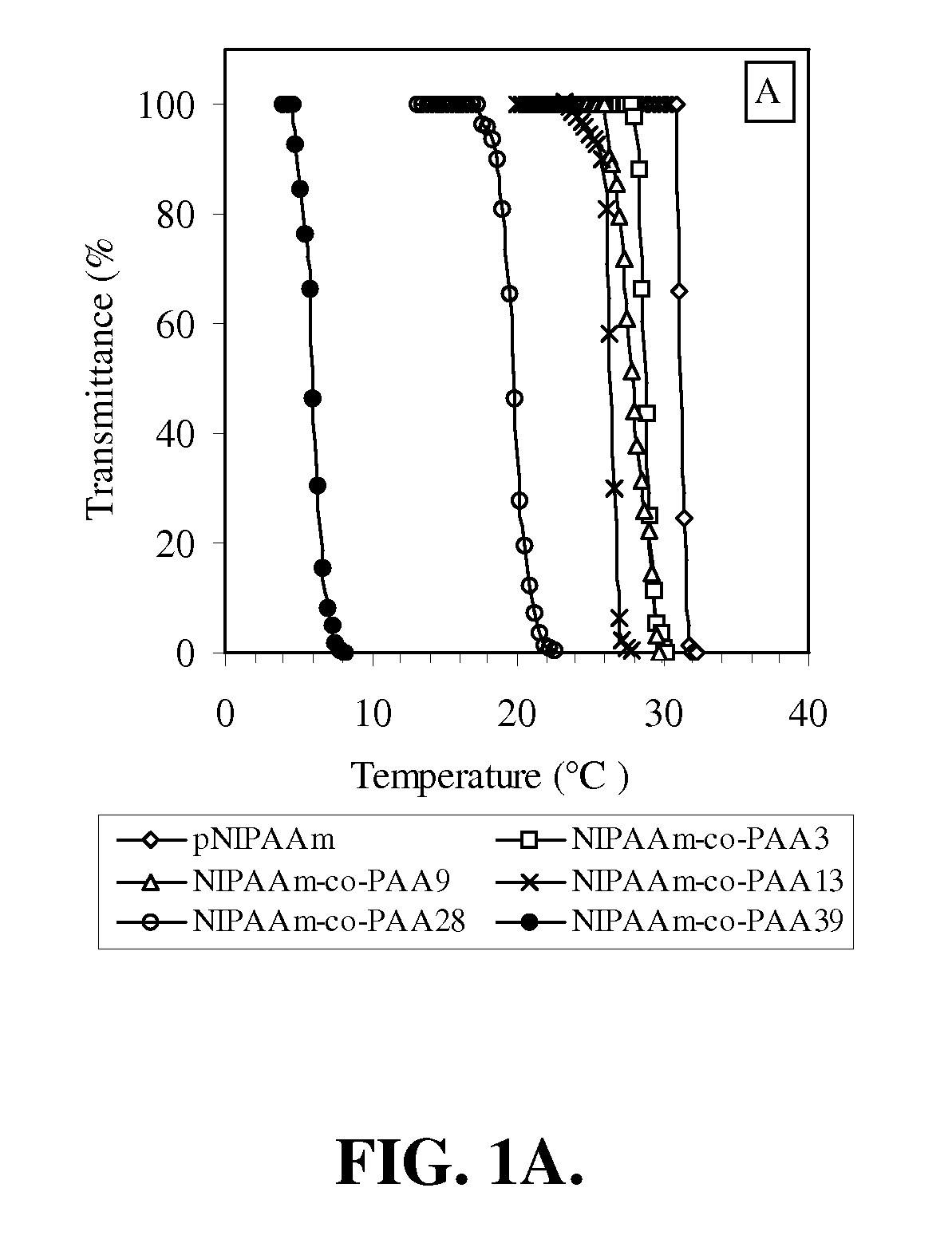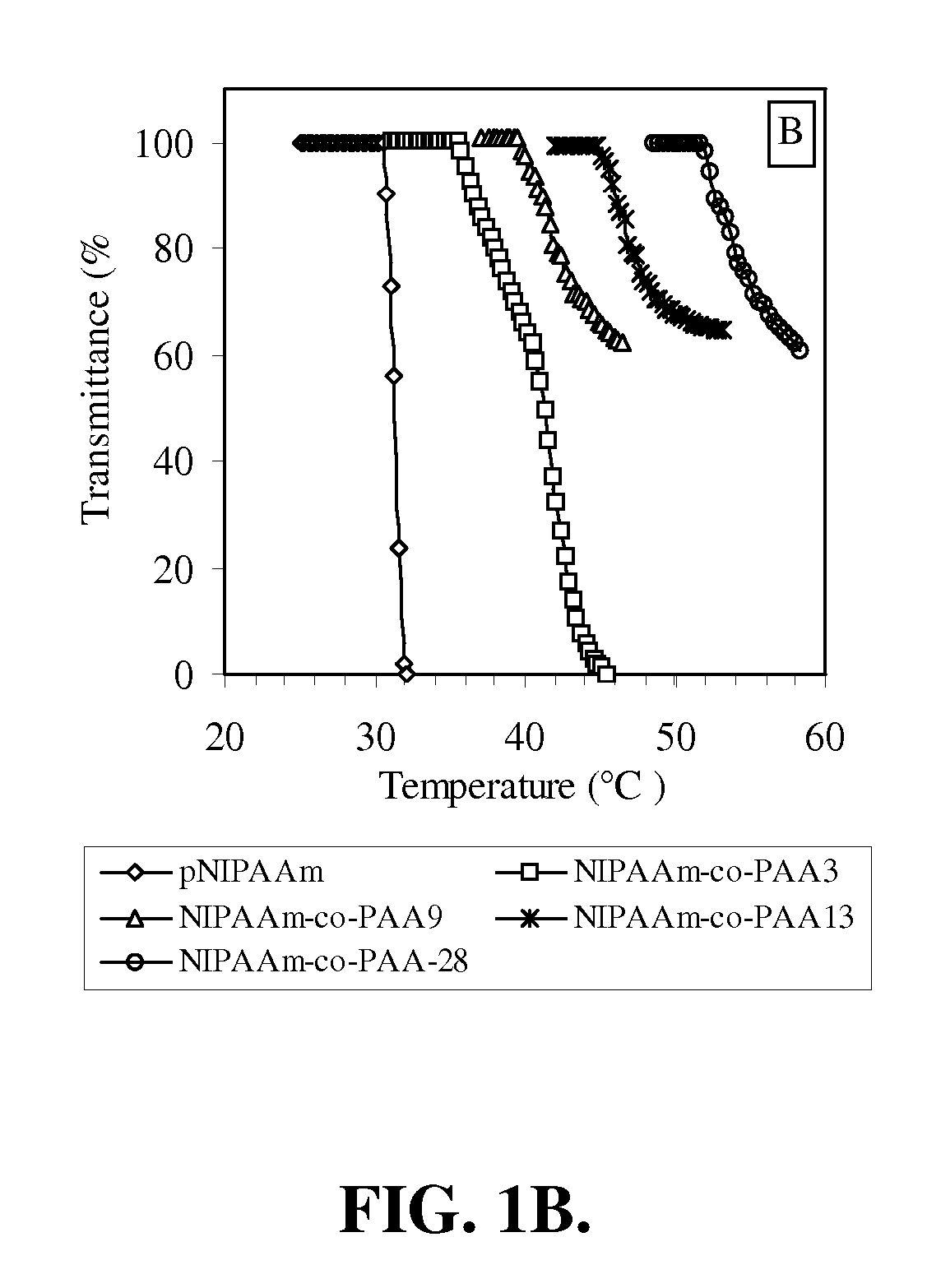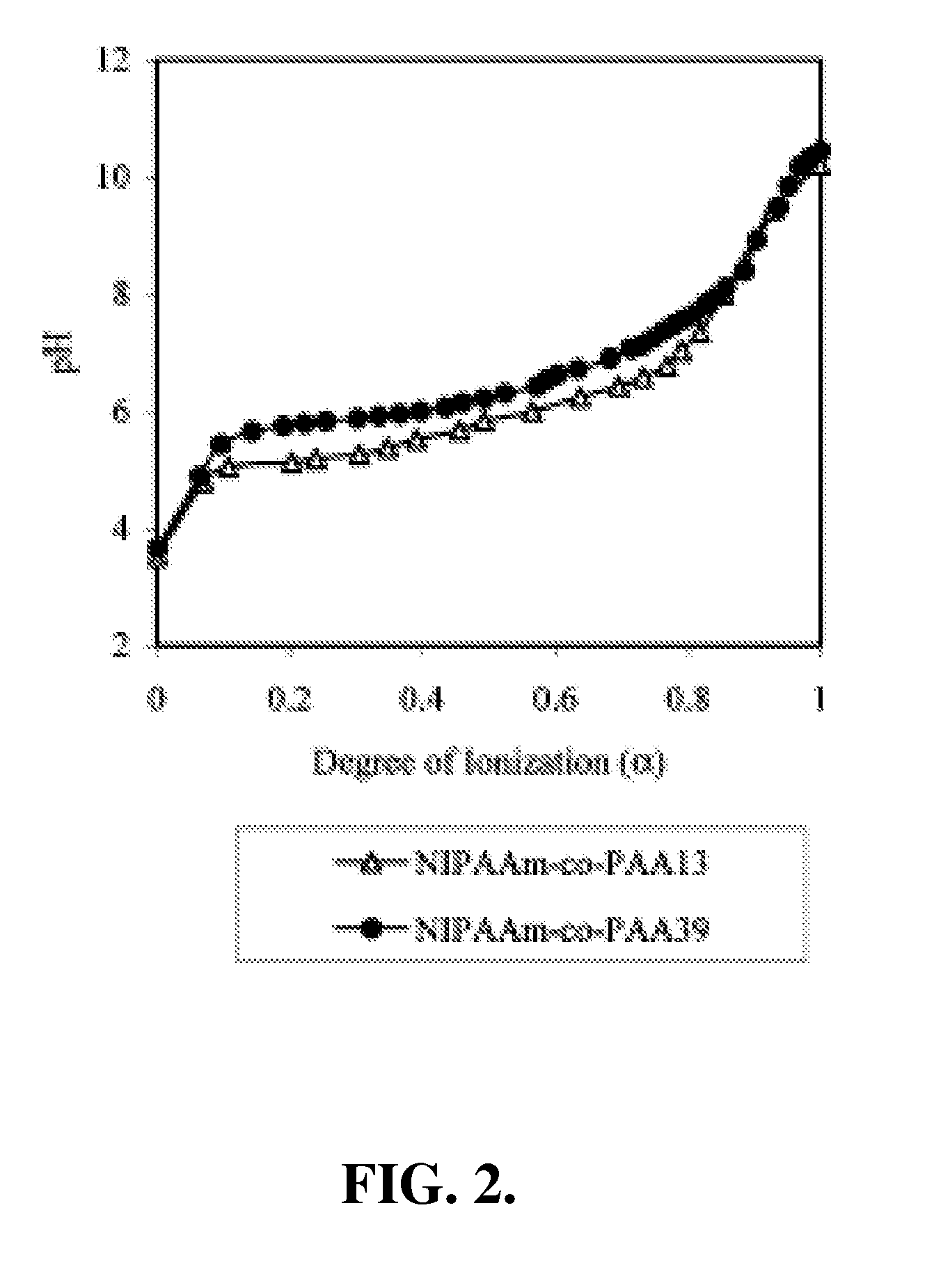Temperature- and pH-responsive polymer compositions
a polymer composition and temperature-responsive technology, applied in the field of temperature-responsive and ph-responsive polymer compositions, can solve the problems of many biomolecules, such as peptides and proteins, not stable at low ph, and the abrupt and large volume phase transition of nipaam and acrylic acid copolymer hydrogels in an ideal ph rang
- Summary
- Abstract
- Description
- Claims
- Application Information
AI Technical Summary
Benefits of technology
Problems solved by technology
Method used
Image
Examples
example 1
The Preparation and Characterization of a Representative Temperature and pH-Responsive Copolymer
NIPAAm-co-PAA
[0156]In this example, the preparation and characterization of a representative temperature and pH-responsive copolymer of the invention, NIPAAm-co-PAA, is described.
[0157]Materials. All chemicals were purchased from Aldrich and used as received unless otherwise noted. N-Isopropylacrylamide (NIPAAm) was recrystallized from hexane prior to use. Propylacrylic acid (PAA) was synthesized according to the protocols published previously. The trithiocarbonate RAFT chain transfer agent (CTA), 2-dodecylsulfanylthiocarbonylsulfanyl-2-methyl propionic acid (DMP).
[0158]Polymerization. In a typical procedure, a 10 mL round-bottom flask was charged with NIPAAm (2.36 g, 20.9 mmol), PAA (0.125 g, 1.10 mmol), azobis(isobutyronitrile) (AIBN) (3 mg, 1.83×10−5 mol), 2-dodecylsulfanylthiocarbonylsulfanyl-2-methyl propionic acid (DMP) (33.0 mg, 9.15×10−5 mol) and methanol (2.50 ml, HPLC grade). Th...
example 2
The Preparation and Characterization of a Representative Temperature and pH-Responsive Hydrogel
Crosslinked NIPAAm-co-PAA
[0162]In this example, the preparation and characterization of a representative temperature and pH-responsive hydrogel of the invention, crosslinked NIPAAm-co-PAA, is described.
[0163]Materials. All chemicals were purchased from Aldrich and used as received unless otherwise noted. N-Isopropylacrylamide (NIPAAm) was recrystallized from hexane prior to use. Propylacrylic acid (PAA) was synthesized according to the protocols published previously. PAA monomer was neutralized with a concentrated NaOH solution into a 34 wt % aqueous solution.
[0164]Hydrogel Synthesis. For a typical procedure, NIPAAm (475 mg), PAA (73.5 mg, 34 wt %) and N,N′-methylenebisacrylamide (MBAm, 13.6 mg) were dissolved in 4.5 mL, of deionized water. Initiator ammonium persulfate (APS; 25 μL, 10 wt %) and accelerator N,N,N′N′-tetramethylethylenediamine (TEMED; 10 μL) were mixed with the monomer solu...
example 3
The Preparation of Representative Temperature and pH-Responsive Hydrogels for Therapeutic Drug or Diagnostic Agent Storage and Delivery
Crosslinked NIPAAm-co-PAA
[0167]In this example, the preparation a representative temperature and pH-responsive hydrogel of the invention, crosslinked NIPAAm-co-PAA, useful in therapeutic drug or diagnostic agent storage and delivery is described. In this example, the representative therapeutic drug or diagnostic agent is horseradish peroxidase conjugated rabbit anti-plasmodium aldolase or peroxidase conjugated monoclonal IgG anti-plasmodium falciparum (PfHRP2).
[0168]Materials. All chemicals were purchased from Sigma-Aldrich (St. Louis, Mo.) and used as received unless otherwise noted.
[0169]Membrane modification. Biodyne C membranes (0.45 μm pore size; Pall Corporation, East Hills, N.Y.), which have surfaces populated with reactive carboxyl groups, were exposed to a mixture of N-ethyl-N′-(3-dimethylaminopropyl)carbodiimide (EDC) and poly-L-lysine in D...
PUM
| Property | Measurement | Unit |
|---|---|---|
| pH | aaaaa | aaaaa |
| temperature- | aaaaa | aaaaa |
| pH | aaaaa | aaaaa |
Abstract
Description
Claims
Application Information
 Login to View More
Login to View More - R&D
- Intellectual Property
- Life Sciences
- Materials
- Tech Scout
- Unparalleled Data Quality
- Higher Quality Content
- 60% Fewer Hallucinations
Browse by: Latest US Patents, China's latest patents, Technical Efficacy Thesaurus, Application Domain, Technology Topic, Popular Technical Reports.
© 2025 PatSnap. All rights reserved.Legal|Privacy policy|Modern Slavery Act Transparency Statement|Sitemap|About US| Contact US: help@patsnap.com



